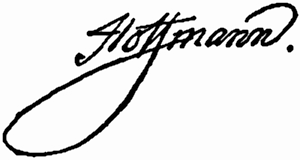The sceptical expert in law (Der skeptische Jurist)
- Reluctant to return to government service: After the failure of an artistic career in Bamberg and Dresden Hoffmann only doubtfully returned to civil service.
- „I can’t let go of art anymore, and if I didn’t have to take care of a sweet-hearted woman and give her a comfortable position after what she didn’t like with me, I’d rather do the musical school master again than let myself drill in the legal fulling mill“ (Letter to Hippel on March 12th, 1815)
- “… so also my disgust at a business which, as it is now run, can only arise this pleasure and boredom. Remember, dearest friend, that it has never been my idea to return to law because the art I swore to is too deceived…“(Letter 28.04.1815 to Hippel)
Concise administration – bizarre fantasy
- “(Hoffmann) has completely met the expectations (…). The peculiar precision he works with does not harm the thoroughness.“ (Fr. V. Trützschler von Falkenstein, vice president of the supreme court on December 12th, 1815)
- “…and the exuberant fantasy going into strange, which is predominant in the same, contest in a strange way and with the seriousness with which he as a judge goes to work…”(Trützschler 10.1 1819)
Fight for the right in times of demagogue persecution
The murder of the poet August von Kotzebue by the student Sand is the reason for the Carlsbad Decrees in 1819. They are directed against any anti-state conviction of a liberal or nation state nature. These decrees created an atmosphere of political intolerance against liberals and persecution follows. A “royal investigation commission” is set up for this purpose and Hoffmann is appointed a member of this commission by the order of the King’s cabinet on October 1st, 1819. The poet-lawyer now has demagogic drives to examine. To his friend Hippel: “…as you know me, you may imagine my mood when a whole web of hopeless arbitrariness, impudent disregard for all laws, personal animosity developed before my eyes! Here it was time to punish with all severity on a legal path. But instead measures occurred which were not only directed against the deeds but against convictions…”(letter from 24.6.1820)
- In the spirit of a modern conception of justice, Hoffmann makes himself the defender of the famous father Jahn, who has been arrestet for „demagogy“. He allows Jahn to file a lawsuit against the director of the police department in the ministry of the interior, Carl von Kamptz, his bitter enemy.
